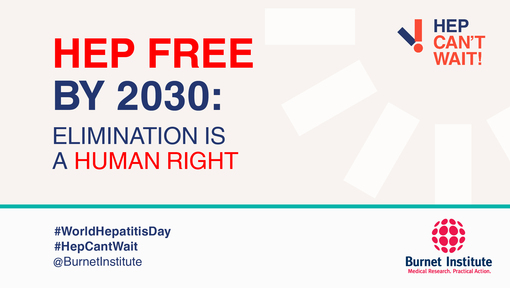
A rights-based approach was the recurring theme of Burnet Institute’s World Hepatitis Day webinar ‘Hep Free by 2030: Elimination is a human right’ held on Monday, 25 July 2022.
The event brought together experts and peers from Burnet, Hepatitis SA, La Trobe University, the Institute for Urban Indigenous Health, Queensland Injectors Health Network and Harm Reduction Victoria to discuss what a rights-based approach involves, how it’s helping in our efforts to eliminate hepatitis C and the ‘It’s Your Right’ public health campaign.
La Trobe’s Associate Professor Kate Seear acknowledged that although there’s much enthusiasm about treatment with direct-acting antivirals and their potential to eliminate hepatitis C, there is a need to address multiple and deeply entrenched social issues and legal challenges.
“We work in a context where there is ongoing potential for the rights of people who use drugs, and people with hepatitis C, to be readily limited or even trampled, and there are a few protections against this happening in Australia,” Associate Professor Seear said.
Her research has shown there is also a growing risk that people’s rights might be treated differently, spurred on by the unique context and pressures of the race to eliminate hepatitis C by 2030.
For example, some groups have argued that we should not seek people’s informed consent to be tested for hepatitis C given the critical importance of finding, diagnosing and then treating these populations.
“It’s really important that we test and treat those who’ve not yet been tested and treated, but I think we have to be careful in terms of how we go about that essentially,” Associate Professor Seear said.
Nor do all these problems disappear after people are cured of hepatitis C.
An example she gave of this was medical records. If a person has been diagnosed with hepatitis C, that past hepatitis C status continues to stick in their records and follows them around.
“If people turn up to a dentist or a doctor or a hospital, and it’s known that they once had hepatitis C, they report continuing in some instances to be treated differently, to experience stigma and discrimination,” Associate Professor Seear said.
As a bare minimum, she would like to see a mechanism introduced by which people who have previously tested positive for hepatitis C but have now been cured, could have their past status removed from their records.
It’s Your Right
It’s this stigma and discrimination EC Australia’s (Eliminate Hepatitis C Australia) ‘It’s Your Right’ campaign - which aims to increase hepatitis C testing and treatment in people who inject drugs - is seeking to dismantle.
“All the way through developing our It’s Your Right campaign we really had to work out and constantly reassess how we could overcome stigma and discrimination,” said EC Australia Program Manager–Health Promotion Emily Adamson.
“So in developing the campaign, we avoided developing or using fear-based messages, we used bold, confident and empowering messages.”
And they made peer-led conversations a cornerstone of the campaign.
“We wanted to go beyond just raising awareness and providing information, we wanted to support people through the testing pathway and through to treatment,” Ms Adamson said.
This targeted messaging approach worked for Hepatitis SA’s Carol Holly.
“Having targeted messaging … showed that people who inject drugs are worthwhile. They have value, and they deserve to live a quality and healthy life,” she said.
Having a part of the campaign specifically for those from Aboriginal and Torres Strait Islander groups helped engage First Nations community members, said Gubbi Gubbi Wakka Wakka man Colin Mickelo from the Institute for Urban Indigenous Health.
Usually First Nations people feel a bit let down when they only see advertising directed to the dominant culture but “the posters are really, really deadly,” he said.
For Queensland Injectors Health Network’s Esha Leyden, the campaign has started a lot of conversations with clients.
“It’s made our clients feel like they can come into our organisations and talk about hep C in a non-judgmental environment with no stigma or discrimination around it,” she said.
Harm Reduction Victoria CEO Sione Crawford applauded the campaign’s health as a human right message, but he said more needs to be done because many people with hep C who inject don’t think this applies to them.
“This is great positive messaging because so many of us don’t actually feel this way, we need campaigns like this to speak directly to our community,” he said.
“This is great positive messaging because so many of us don’t actually feel this way, we need campaigns like this to speak directly to our community.”
